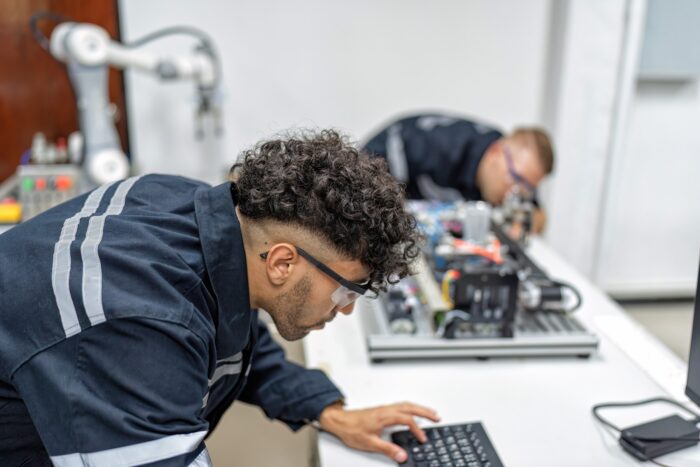CNC Programmers & Operators
In the aviation industry, CNC (Computer Numerical Control) programmers and operators play crucial roles in the manufacturing and maintenance of aircraft components. Their primary responsibilities involve using CNC machines to produce precision parts and ensuring that these components meet the strict quality standards required for aviation applications. Here’s an overview of some of the typical roles and responsibilities for programmers and operators.
CNC Programmers:
- Programming CNC Machines:
- CNC programmers write the code that controls the movements of the machine tools.
- They use CAD (Computer-Aided Design) and CAM (Computer-Aided Manufacturing) software to create detailed instructions for machining operations.
- Toolpath Planning:
- CNC programmers plan the toolpaths that the machines will follow to shape and finish the components.
- They optimize toolpaths for efficiency, accuracy, and to minimize production time.
- Material Selection:
- Selecting the appropriate materials for the aircraft components is crucial for ensuring strength, durability, and compliance with aviation standards.
- Quality Control:
- CNC programmers are responsible for ensuring the quality of the machined parts. They may use various measuring instruments and inspection techniques to verify that the components meet design specifications.
- Problem Solving:
- Troubleshooting and solving issues related to machining processes, tool wear, and machine malfunctions.
CNC Operators:
- Machine Setup:
- CNC operators set up and prepare the CNC machines for production, including loading raw materials and installing cutting tools.
- Machine Operation:
- They operate the CNC machines during production, monitoring the process to ensure it runs smoothly and making adjustments as necessary.
- Quality Assurance:
- CNC operators perform basic quality checks during production to ensure that the machined parts meet the required specifications.
- Maintenance:
- Performing routine maintenance on CNC machines, such as cleaning, lubricating, and replacing worn tools or parts.
- Documentation:
- Keeping detailed records of production runs, machine settings, and any issues encountered during the manufacturing process.
In the aviation industry, precision and quality are paramount. CNC programmers and operators contribute significantly to achieving these standards in the production of aircraft components, ranging from structural elements to engine parts. Their work directly impacts the safety, reliability, and performance of aircraft.
Is CNC Programmer / Operator A Good Career?
A career as a CNC programmer or operator in the aviation industry can be a rewarding and promising path for individuals interested in manufacturing, engineering, and technology. Here are some factors to consider when evaluating whether it’s a good career for you:
- Job Stability: The aviation industry, including aircraft manufacturing and maintenance, tends to be stable. As long as there is a demand for new aircraft and the maintenance of existing ones, there will be a need for skilled CNC professionals.
- Technological Advancements: CNC technology continues to evolve, and professionals in this field have the opportunity to work with cutting-edge equipment and software. Staying up-to-date with the latest advancements can enhance your skills and make you more valuable in the job market.
- Global Opportunities: The aviation industry is international, and skilled CNC professionals may find opportunities to work with leading aerospace companies around the world. This can lead to a diverse and exciting career.
- Specialization Opportunities: Within CNC programming and operating, there are opportunities for specialization. For example, you might focus on programming specific types of machines or specialize in the production of certain aircraft components. Specialization can make you more marketable and open doors to higher-level positions.
- Job Satisfaction: Working on components that contribute to the construction and maintenance of aircraft can be fulfilling. The precision and attention to detail required in CNC work often appeal to individuals who enjoy problem-solving and working with technology.
- Career Advancement: With experience and continuous learning, CNC professionals can advance into supervisory or management roles. Additionally, pursuing further education or certifications can open doors to higher-paying positions.
- Challenges: Like any career, there may be challenges, such as meeting tight deadlines, troubleshooting machine issues, or adapting to changes in technology. However, overcoming these challenges can contribute to personal and professional growth.

